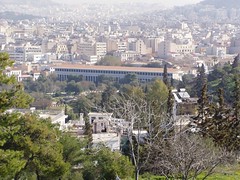The handout called Athenian Democracy begins with Orators and Demagogues and lists the qualifications needed to participate in the deliberations of the Assembly. Excluded were women, Greeks from the colonies (such as Napolis), slaves (33% of the population, acc. to the Doerling-Kinserly book Ancient Greece) and non-Greeks, known as barbarians.
Checks and balances: ostracism, rotated duties ("term limits"), freedom of speech, playwrights' presentations and the work of philosophers.
Curiously, the Greeks of 500 BC developed a system of Trial by Jury.
On the subject of women's roles, please note the term courtesan. These women held high status in ancient Greece.
A courtesan is a person paid and/or supported for the giving of social companionship and intimate liaisons to one or more partners. The word is generally reserved for those who enjoyed the highest social status for such services, says wikipedia.org.
Whether the role of courtesans should be romanticized or scorned is a matter of dispute. On the positive side, they had freedoms that were extremely rare for other women at the time. They were not only financially comfortable (when business was good), but financially independent, with control of their own resources rather than dependency on male relatives. They were very well-educated, compared even to upper-class women, and often held simultaneous careers as performers and artists. On the negative side, courtesans were, as a means of survival, dependent on upper-class "protectors" to provide them with shelter and support. They were required to provide charming companionship for extended periods, no matter what their own feelings might be at the time. They were also, because of the sexual aspects of their profession, subject to lower social status and religious disapproval.
Baklava, biscotti, pasta and sauce: thanks and congrats to the generous chefs who've added tastes of the Mediterranean to recent classes. Among them: Suparsh Tanga, Ashley Hazel, Kaitlyn Kehoe, Raciel Pintado, Matthew Geeen, Martin Marak, Meaghan Connor.
What is the agora? The forum of a Greek city.
From answers.com:
agora (ăg'ərə) [Gr.,=market], in ancient Greece, the public square or marketplace of a city. In early Greek history the agora was primarily used as a place for public assembly; later it functioned mainly as a center of commerce. Usually in a readily accessible part of the city, it was often surrounded by the public buildings, such as the royal palace, the law courts, the assembly house, and the jail. A favorite architectural device was the colonnade surrounding the agora. One of the highest honors was to be granted a tomb in the agora. The agora was similar to the Roman forum.
Do you relate to the syndrome called agoraphobia?
Fear of open spaces or of being in crowded, public places like markets. Fear of leaving a safe place.
Subscribe to:
Post Comments (Atom)


No comments:
Post a Comment